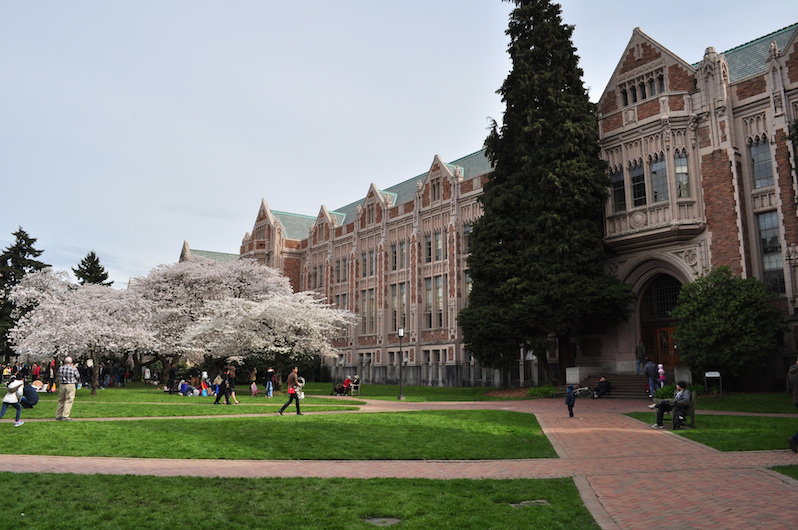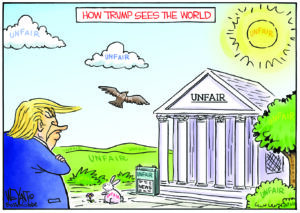The Real Victors in the Judicial Ruling on Trump’s Immigration Ban: This Country’s Universities
It's poetic justice that universities should stand in the way of the president's plans to bar Muslims from entering the U.S.
A three-judge panel from the 9th Circuit Court of Appeals on Thursday denied the Trump administration’s request that the executive order banning Muslims from seven countries from coming to the U.S. be reinstated. It was set aside by a Temporary Restraining Order issued by a federal judge in Seattle.
One thing about this decision leapt out at me: that Trump’s actual opponents are in the main the University of Washington in Seattle, Western Washington University at Bellingham, the University of Minnesota, and other state institutions of higher education in the two states that brought the suit against the EO.
That the universities should stand, at least temporarily, in the way of President Trump’s plans to ban Muslims from the U.S., is poetic justice. Universities are everything that fascists hate. They are machines for shredding the fake news on which the progression of fascism depends. They promote rational tools of thought. They are cosmopolitan and international. They are based on merit and discount race. Fascism maintains that whites are superior to other races in every way, including in intelligence. But physics doesn’t care if you are white or brown. Physics only cares if your formula is correct, i.e. matches up with reality. Alt-NeoNazis like Bannon have no advantage in the university, despite their status as wealthy white males, unlike the situation in populist politics. Indeed, the irrational and apocalyptic discourse of people like Bannon is looked down on and ridiculed by the university community.
It is no accident that one of the first things the Nazis did on coming to power in 1933 was to fire the Jewish university professors. That was only the beginning of the neutering and gutting of the universities under fascism.
The Trump administration argued that Washington State and Minnesota had no standing to sue over the EO, since it had nothing to do with them. Judge James Robart found that the states did have standing to sue, on several grounds. One is that the states fulfill the role of parents or guardians for refugees resident in the state. Washington has at least 25,000 residents from the seven countries being banned, and has the obligation to look out for their interests. Another basis for their standing is that these states are economically harmed by the EO.
The main example of economic harm cited in the TRO is the harm to universities. Everything is telegraphic at this stage in the proceedings, so not a lot of detail is offered. But we can imagine the sorts of harm implied here. I noted last fall:
There are about 1 million international students studying in American universities– nearly 5% of the country’s undergraduate population. Very large numbers of them are on government scholarships or are from wealthy families in their home countries, and the bulk of them pay full tuition. But they also rent apartments and go out to eat, and shop. These international students bring in $30 billion a year to the US economy.
That is, the universities have students from these countries who were getting locked out of the country despite valid visas and travel documents, or even green cards (permanent residency). That is a loss of tuition, dormitory fees, etc. In addition, the universities employ professors and researchers from the seven countries, and so would lose their contribution to research on a scientific project, where those non-citizen researchers may have been playing a crucial role. To have these researchers suddenly and arbitrarily deprived of the ability to follow through on their commitments to these projects is a clear loss to the universities. The numbers of university-related people hurt by the ban would be even greater if green card holders and those with dual citizenship are affected, as was initially asserted by the Trump administration. In the face of massive protests, it backed off these extreme positions, but only via a note from the press secretary. The EO could still at any moment be interpreted to sweep up permanent residents and perhaps even U.S. citizens.
The States argue that the Executive Order causes a concrete and particularized injury to their public universities, which the parties do not dispute are branches of the States under state law . . . Specifically, the States alleged that the teaching and research missions of the universities are harmed by the Executive Order’s effect on their faculty and students who are nationals of the seven affected countries. These students and faculty cannot travel for research, academic collaboration, or for personal reasons, and their families abroad cannot visit. Some have been stranded outside the country, unable to return to the universities at all. The schools cannot consider attractive student candidates and cannot hire faculty from the seven affected countries, which they have done in the past.
The three-judge panel in San Francisco found that the universities do indeed have “third party standing” because their interests are “inextricably bound up with the activity the litigant wishes to pursue…” Moreover, in other cases schools have been allowed to assert the rights of their students. And, the quality of their faculty obviously deeply affects the universities.
So the 3 judges found that the states do have standing to sue, reaffirming the lower court opinion. But note that while the states might have other interests in the EO besides those of the universities, it is these educational harms that are foregrounded in both of the initial decisions staying the EO until larger issues can be addressed.
The Trump administration also tried to argue that the president’s EO is not subject to review by the courts because he has the right to exclude any class of aliens by fiat if he fears they are a danger to national security. The judges laughed this argument right out of court, citing previous court reviews of precisely this sort of policy, as when Bush tried to deny habeas corpus (the right to be produced before a court when charged with a crime) to detainees (‘enemy combatants’) charged with terrorism, and the Supreme Court slapped him down.
A further consideration in upholding the TRO is the Executive Order’s violation of the Establishment Clause. The 1st Amendment in the Bill of Rights forbids the government to make one particular religion a state religion. The panel accepted the States’ argument that statements of Trump, Rudy Giuliani and others make it clear that the EO is a Muslim ban and if so, that it violates the First Amendment. The judges argue that courts have often taken the legislative history into account in striking down laws that have the effect of discriminating with regard to religion. This argument appears to be controversial among the legal scholars, but they do give a lot of case law for this way of proceeding. Those who cite previous instances of U.S. visa or refugee preference for minorities, it seems to me, are on thin ground because those took place before the 1965 Immigration Act, which forbids such discrimination. Likewise, lots of unconstitutional things were done on racist grounds in the past that would not pass muster today. I think both statute and current Supreme Court approaches to the Establishment Cause tell against the discrimination mandated in the EO.
As the case moves through the courts, the deference to the president on national security issues may reemerge as a decisive consideration. This dispute is by no means over, and precedent probably is on the side of the EO. But in these essential first weeks, we can be proud that the universities took a leading role in standing against this Muslim ban, against this affront to the Constitution, against this nasty piece of neofascist bigotry.
Your support matters…Independent journalism is under threat and overshadowed by heavily funded mainstream media.
You can help level the playing field. Become a member.
Your tax-deductible contribution keeps us digging beneath the headlines to give you thought-provoking, investigative reporting and analysis that unearths what's really happening- without compromise.
Give today to support our courageous, independent journalists.






You need to be a supporter to comment.
There are currently no responses to this article.
Be the first to respond.